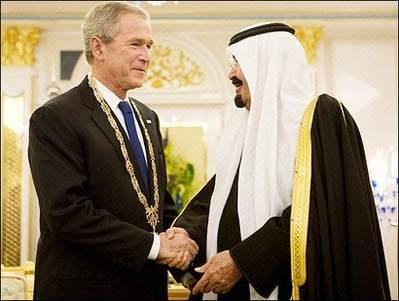Bush urges OPEC to pump more oil
Updated: 2008-01-16 08:16
RIYADH, Saudi Arabia - US President Bush warned Tuesday that surging oil prices threaten the US economy and urged OPEC nations to boost their output.
His plea drew little sympathy from oil-rich Saudi Arabia, which said production levels appear normal.
 Saudi King Abdullah bin Abdul Aziz al-Saud (R) and US President George W. Bush shake hands after Bush was presented with the King Abdul Aziz Order of Merit in Riyadh on January 14. Bush has urged oil producers to take action over near record-high prices, broaching a sensitive topic on the second day of talks with OPEC kingpin Saudi Arabia. [Agencies] |
Bush and Secretary of State Condoleezza Rice also pressed Arab countries to do more to reach out to Israel and help achieve a Mideast peace agreement before the president's term runs out next January. Avoiding specific orders to Arab allies, Rice said the delicate question of diplomatic relations with Israel, the Arab world's historical enemy, was "another matter and undoubtedly down the road."
Saudi Arabia's foreign minister wondered what more could be expected of them than they are already doing. But Bush, nearing the end of an eight-day Mideast trip, expressed confidence that Arab countries would support both sides in an Israeli-Palestinian accord -- backing Washington sees as crucial to striking and sustaining any agreement. "They want to see a deal done," Bush said. "And they want progress because the issue frustrates them."
As economic anxiety grows in the US and dominates the presidential campaign, Bush is under increasing pressure. After a stop in Egypt on Wednesday, Bush returns home to weigh whether to join Democrats and Republicans in offering some sort of short-term economic stimulus package.
He promised to tell Saudi King Abdullah that American families are being hurt by oil prices that have topped $100 a barrel, more than three times what they were when he took office.
"These are times of economic uncertainty but I have confidence in the future -- immediate future," Bush said when asked if the US was sliding toward a recession, as some economists fear.
In public, the same Bush whose early career was in the Texas oilfields and who said during his 2000 presidential campaign that the president must "jawbone" oil-producing nations to drop rates had been silent about the issue on this eight-day trip until Tuesday.
He raised the subject here, in the country with the world's largest supply of oil, during a morning meeting with Saudi business leaders, saying oil prices were very high and "tough on our economy." He spoke more directly, but still gently, in an afternoon meeting with reporters who were unexpectedly summoned to the guest palace where he stayed one of his two nights.
"I hope that OPEC, if possible, understands that if they could put more supply on the market it would be helpful," he said.
Bush conceded that, in reality, increasing ouput would be difficult. The demand for oil is stretching available supplies, he said. And "a lot of these oil-producing countries are full out" in terms of what they can produce, he said.
Besides, any increase may not have a big effect on prices, as many economists say the key factor driving them is increased demand, not supply.
In a chilly response to Bush, Saudi Arabia's oil minister, Ali Naimi, told reporters the kingdom would raise production levels only when the market justifies it and that today's inventory seems normal.
Bush met Abdullah for a second day at his weekend retreat and farm in the desert. At the stables where 260 Arabian horses are kept in air-conditioned stalls, Bush was treated to a trainer parading sleek horses around a showing ring. The president spent the night at the farm in a return gesture for the king's stays, while crown prince, at Bush's ranch in Texas.
Bush couched his concern about oil prices both in terms of the pain suffered by US consumers and the possible consequences of that for Saudi Arabia. "It could cause this economy to slow down," Bush said. "If the economy slows down, there will be less barrels of oil purchased."
The Organization of Petroleum Exporting Countries, which accounts for about 40 percent of the world's needs, next meets Feb. 1 in Vienna, Austria, to consider increasing output.
Returning to a recurring theme of his trip, Bush stepped up warnings to Iran not to meddle with US warships in the Persian Gulf after a Jan. 6 encounter that was deemed threatening by American officials. The president said there would be "serious consequences" for Iran if a US vessel was attacked, whether or not it were ordered by the government in Tehran or was the result of a rash decision by an Iranian boat captain.
|
|
|
||
|
||
|
|
|
|

